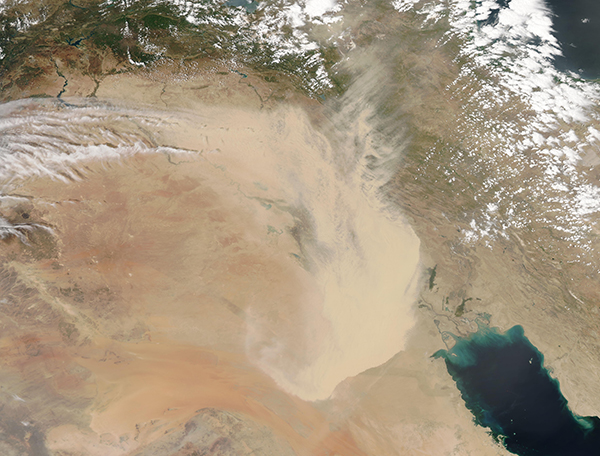Images
May 17, 2022 - Massive Middle East Dust Storm
Tweet
A massive dust storm driven by high wind billowed over much of the Middle East on May 16, 2022, turning skies orange, blanketing cars and buildings with dust, and sending thousands to the hospital. The Moderate Resolution Imaging Spectroradiometer (MODIS) on board NASA’s Aqua satellite acquired a true-color image of the damaging storm on that same day, when a dense cloud of dust covered parts of eastern Syria, Iraq, Saudi Arabia, and Iran. In this image, the edge of the dust cloud sat along the border with Kuwait, but that country was also engulfed in sand.
Iraq felt the brunt of the dangerous storm, where at least 4,000 people were sent to the hospital with breathing problems. One report described victims as literally “suffocating” from the aerosolized particles, which clogged airways and burned eyes. Two people died from the storm in northeastern Syria, where winds reached 88 km/h (55 mph) and toppled high-voltage towers. Reduced visibility resulted in the closure of airports in Baghdad, Najaf, and Sulaymaniyah in Iraq as well as Kuwait International Airport. Public schools, universities, and public offices were closed across Iraq. In Kuwait, the final game of the Amiri Cup, a major and hotly-contested football (soccer) tournament, was delayed due to the sandstorm, to ensure the safety of both footballers and fans.
Dust storms are a major natural hazard across most of the Middle East, including Iraq. In recent years, increasing desertification, intense drought, increasingly high temperatures, and low rainfall—all effects of climate change—are causing increasingly frequent dust storms in the region. This storm is the eight to strike Iraq since early April. In April, an environment ministry official warned that Iraq could face 272 days of dust each year within the next twenty years.
Image Facts
Satellite:
Aqua
Date Acquired: 5/16/2022
Resolutions:
1km (1.7 MB), 500m (4.5 MB), 250m (2.8 MB)
Bands Used: 1,4,3
Image Credit:
MODIS Land Rapid Response Team, NASA GSFC
Tweet
A massive dust storm driven by high wind billowed over much of the Middle East on May 16, 2022, turning skies orange, blanketing cars and buildings with dust, and sending thousands to the hospital. The Moderate Resolution Imaging Spectroradiometer (MODIS) on board NASA’s Aqua satellite acquired a true-color image of the damaging storm on that same day, when a dense cloud of dust covered parts of eastern Syria, Iraq, Saudi Arabia, and Iran. In this image, the edge of the dust cloud sat along the border with Kuwait, but that country was also engulfed in sand.
Iraq felt the brunt of the dangerous storm, where at least 4,000 people were sent to the hospital with breathing problems. One report described victims as literally “suffocating” from the aerosolized particles, which clogged airways and burned eyes. Two people died from the storm in northeastern Syria, where winds reached 88 km/h (55 mph) and toppled high-voltage towers. Reduced visibility resulted in the closure of airports in Baghdad, Najaf, and Sulaymaniyah in Iraq as well as Kuwait International Airport. Public schools, universities, and public offices were closed across Iraq. In Kuwait, the final game of the Amiri Cup, a major and hotly-contested football (soccer) tournament, was delayed due to the sandstorm, to ensure the safety of both footballers and fans.
Dust storms are a major natural hazard across most of the Middle East, including Iraq. In recent years, increasing desertification, intense drought, increasingly high temperatures, and low rainfall—all effects of climate change—are causing increasingly frequent dust storms in the region. This storm is the eight to strike Iraq since early April. In April, an environment ministry official warned that Iraq could face 272 days of dust each year within the next twenty years.
Image Facts
Satellite:
Aqua
Date Acquired: 5/16/2022
Resolutions:
1km (1.7 MB), 500m (4.5 MB), 250m (2.8 MB)
Bands Used: 1,4,3
Image Credit:
MODIS Land Rapid Response Team, NASA GSFC




